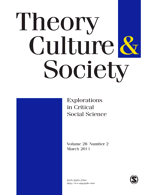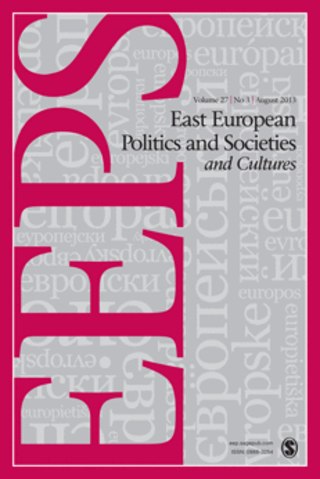
Manuel Castells Oliván is a Spanish sociologist. He is well known for his authorship of a trilogy of works, entitled The Information Age: Economy, Society and Culture. He is a scholar of the information society, communication and globalization.
Youth & Society is a peer-reviewed academic journal that publishes papers in the field of sociology. The journal's editor is Marc Zimmerman. It has been in publication since 1969 and is currently published by SAGE Publications.
Science & Society: A Journal of Marxist Thought and Analysis is a quarterly peer-reviewed academic journal of Marxist scholarship. It covers economics, philosophy of science, historiography, women's studies, literature, the arts, and other social science disciplines from a Marxist point of view. As well as covering social and political theory, it includes first-order historical research. The journal was established in 1936 and is published by Guilford Publications. The editor-in-chief is Julio Huato.

The Journal of Conflict Resolution is a bimonthly peer-reviewed academic journal covering research on international conflict and conflict resolution. It was established in 1957 and is published by SAGE Publications. The editor-in-chief is Paul Huth.
The Archives of Sexual Behavior is a peer-reviewed academic journal in sexology. It is the official publication of the International Academy of Sex Research.
Historical Materialism is a quarterly peer-reviewed academic journal focused on the study of Marxist philosophy, historical materialism, political science, economics, modern society, and human history using a Marxist approach.

Antipode: A Radical Journal of Geography is a peer-reviewed scientific journal published five times per year by Wiley-Blackwell and produced by The Antipode Foundation. Its coverage centers on critical human geography and it seeks to encourage radical spatial theorizations based on Marxist, socialist, anarchist, anti-racist, anticolonial, feminist, queer, trans*, green, and postcolonial thought. Originally inspired by the social justice movements of the 1960s, the journal supports progressive causes through the work of the Antipode Foundation, a UK registered charity. Antipode is also known for its online "Interventions", its book series, and its diverse workshops and lectures. The chief co-editors are Sharad Chari, Tariq Jazeel, Katherine McKittrick, Jenny Pickerill and Nik Theodore.

The Journal of Contemporary History is a quarterly peer-reviewed academic journal covering the study of history in all parts of the world since 1930. It was established in 1966 by Walter Laqueur and George L. Mosse. Originally published by Weidenfeld & Nicolson it was purchased by SAGE Publications in 1972. The editors-in-chief are Richard J. Evans and Mary C. Neuburger.
Evolutionary Psychology is a peer-reviewed open access academic journal published since 2003. It covers empirical, philosophical, historical, and socio-political aspects of evolutionary psychology. Its editors-in-chief are Todd K. Shackelford, Bernhard Fink, David A. Puts, and Rebecca Sear. In 2015 the journal moved to SAGE Publications.

Theory, Culture & Society is a peer-reviewed academic journal that was established in 1982 and covers sociology, cultural, and social theory. The journal aims to work "across the borderlines between sociology and cultural studies, the social sciences and the humanities and has moved towards a broader transdisciplinary frame of reference." It is published by SAGE Publications. The editor-in-chief is Mike Featherstone. The journal is also linked to the journal Body & Society and has its own book series featuring the work of theorists.
Sociological Perspectives is the official publication of the Pacific Sociological Association. It is a peer-reviewed academic journal published in six issues each year by SAGE. It was first published in 1957 as The Pacific Sociological Review, with John M. Foskett as founding editor. Since 1983 it is known under its current name.

New Media & Society is a peer-reviewed academic journal covering the fields of sociology, media, and communication. The journal's editor-in-chief is Steve Jones. It has been in publication since 1999 and is published by SAGE Publishing.

Social Studies of Science is a bimonthly peer-reviewed academic journal that publishes papers relating to the history and philosophy of science. The journal's editors-in-chief are Nicole Nelson, Associate Professor in the Department of Medical History and Bioethics at the University of Wisconsin-Madison, and Sergio Sismondo, Professor of Philosophy and Arts & Sciences at Queen's University. The journal was established in 1971 under the name Science Studies and assumed its present title in 1975. It is currently published by SAGE Publications.

Psychology of Music is a peer-reviewed academic journal that publishes papers in the field of music psychology. The editor-in-chief is Alexandra Lamont. It was established in 1973 and is published by SAGE Publications on behalf of the Society for Education, Music and Psychology Research.

East European Politics and Societies is a peer-reviewed academic journal that covers the field of political science, especially concerning international relations of Eastern Europe. The journal's editors-in-chief are Wendy Bracewell and Krzysztof Jasiewicz. It was established in 1986 and is currently published by SAGE Publications in association with the American Council of Learned Societies and the American Association for the Advancement of Slavic Studies.

The European Journal of Women's Studies is a peer-reviewed academic journal that publishes papers in the field of women's studies. It is published quarterly by SAGE Publications. The journal's editors-in-chief are Kathy Davis and Gail Lewis. It publishes articles, reviews, conference reports, topical and polemical pieces, and overviews on the state of women's studies in various European countries. The journal has published special issues on subjects including women and war, gender and religion, and the politics of identification.

The European Journal of Social Theory is a quarterly peer-reviewed academic journal that covers all aspects social theory. The editor-in-chief is Gerard Delanty. The journal was established in 1998 and is published by SAGE Publications.

Alternatives: Global, Local, Political is a peer-reviewed academic journal that covers the field of international relations. The journal's editor-in-chief is Lacin Idil Oztig. It has been in publication since 1975 and is published by SAGE Publications in association with the Centre for the Study of Developing Societies.

Journalism & Mass Communication Quarterly is a quarterly peer-reviewed academic journal that covers the field of communication and journalism. The editor-in-chief is Daniela Dimitrova. The journal was established in 1924 as the Journalism Bulletin, the flagship journal of the Association for Education in Journalism and Mass Communication. It is published by SAGE Publishing in association with the Association for Education in Journalism and Mass Communication. It publishes original articles and book reviews on topics including theoretical and methodological developments in journalism and mass communication, international communication, media technologies and society, advertising, public relations, journalism history, media law and policy, media management and economics, political communication, and health communication.

Feminist Review is a triannual peer-reviewed academic journal with a focus on exploring gender in its multiple forms and interrelationships. The journal was established in 1979. It is published by SAGE Publishing and is edited by a collective.














